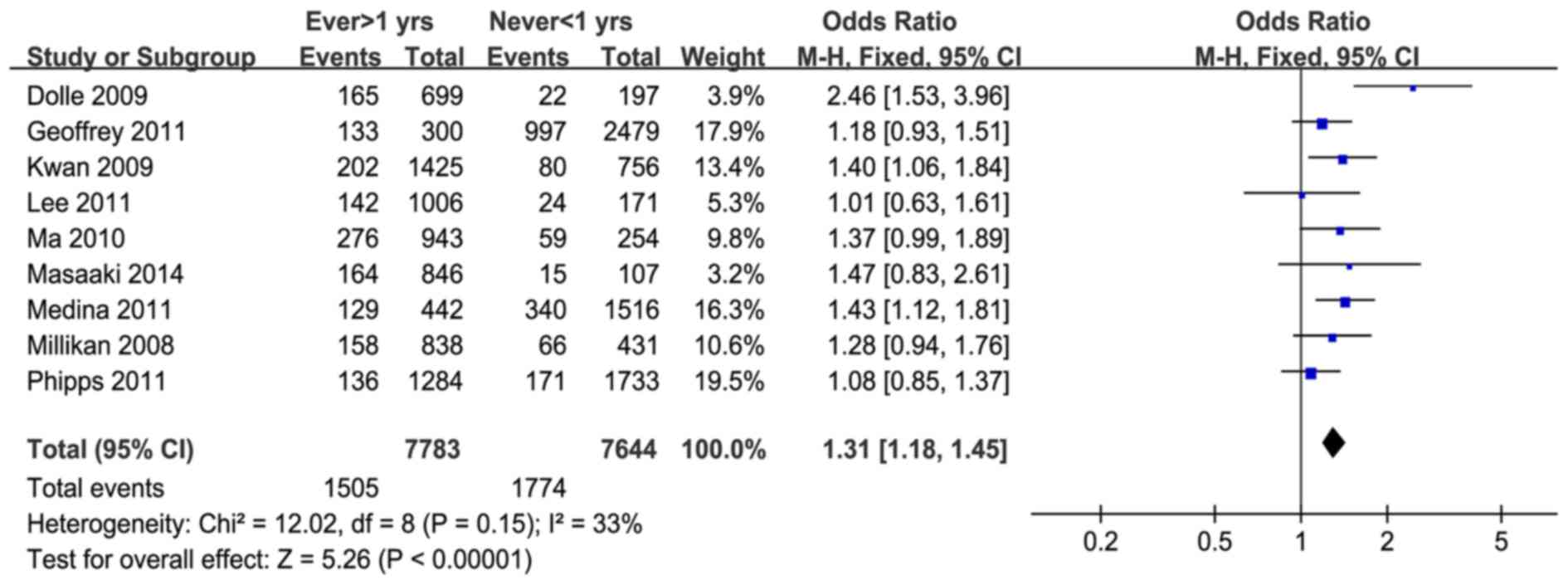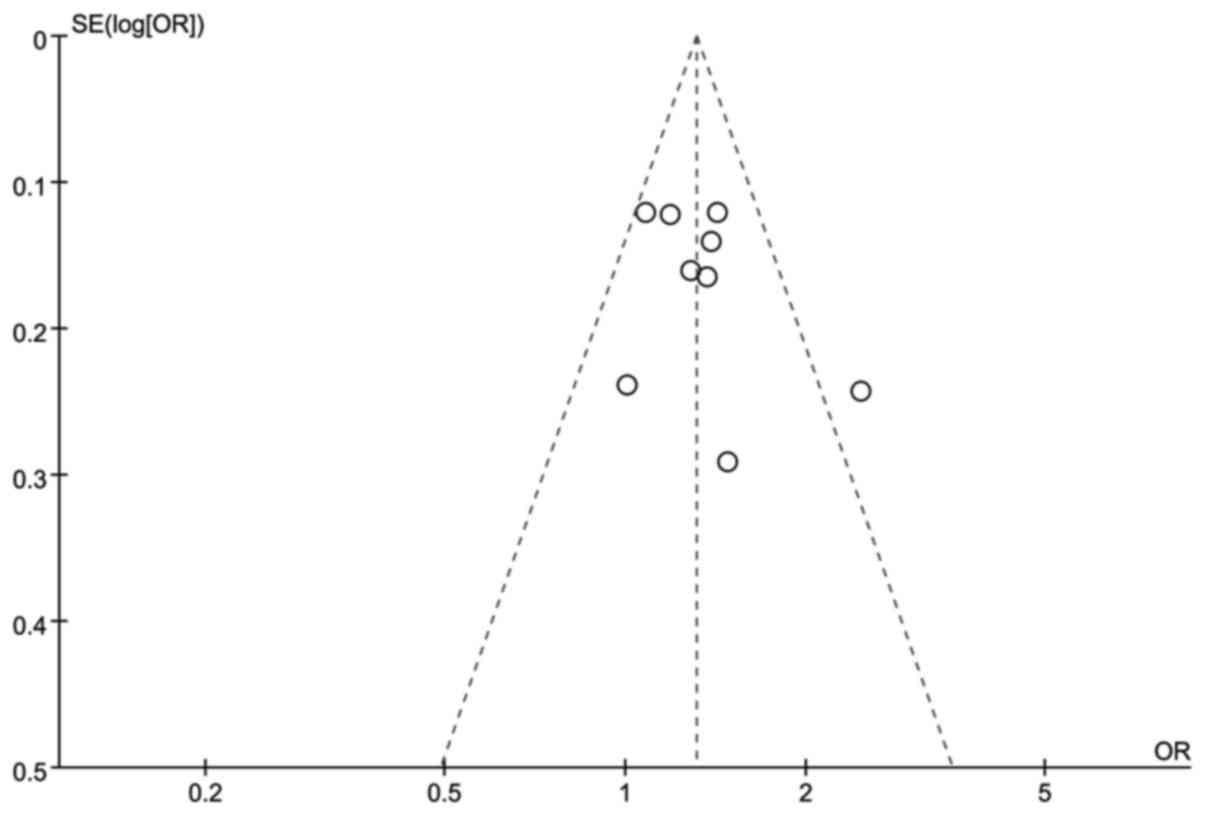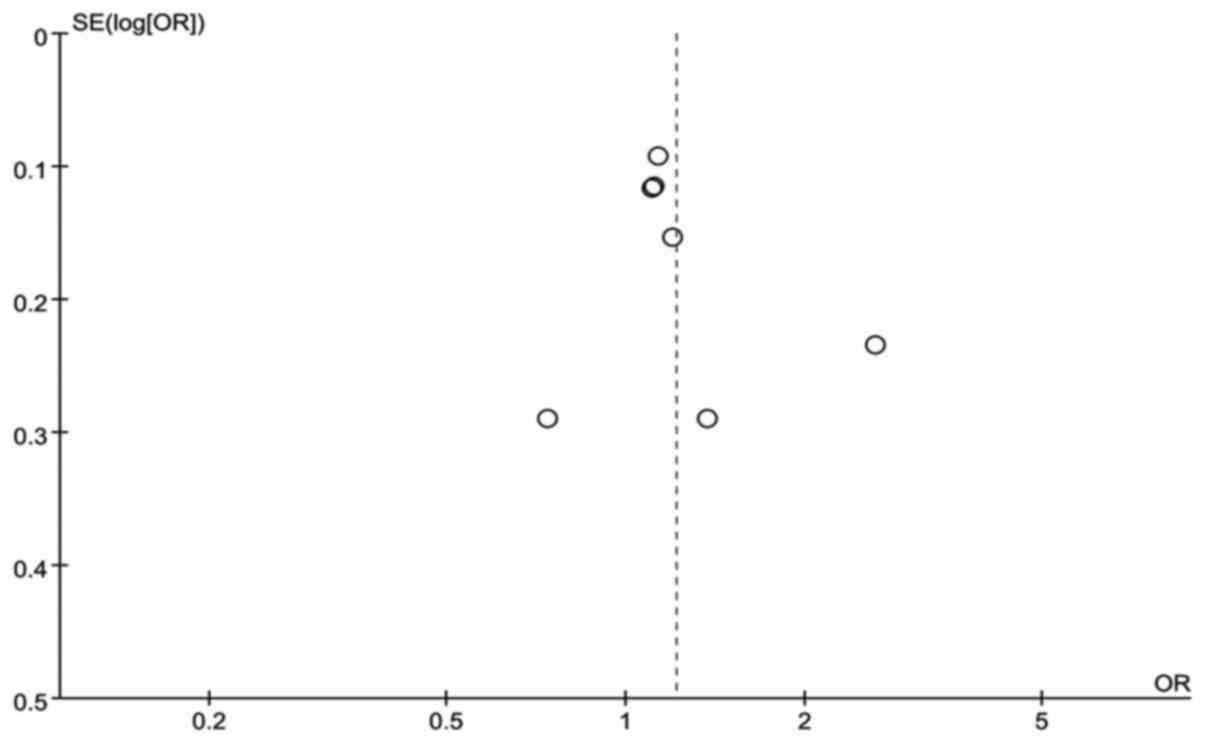|
1
|
Jemal A, Siegel R, Ward E, Hao Y, Xu J,
Murray T and Thun MJ: Cancer statistics, 2008. CA Cancer J Clin.
58:71–96. 2008. View Article : Google Scholar : PubMed/NCBI
|
|
2
|
Rakha EA and Ellis IO:
Triple-negative/basal-like breast cancer: review. Pathology.
41:40–47. 2009. View Article : Google Scholar : PubMed/NCBI
|
|
3
|
Huo D, Ikpatt F, Khramtsov A, Dangou JM,
Nanda R, Dignam J, Zhang B, Grushko T, Zhang C, Oluwasola O, et al:
Population differences in breast cancer: survey in indigenous
African women reveals over-representation of triple-negative breast
cancer. J Clin Oncol. 27:4515–4521. 2009. View Article : Google Scholar : PubMed/NCBI
|
|
4
|
Lv M, Li B, Li Y, Mao X, Yao F and Jin F:
Predictive role of molecular subtypes in response to neoadjuvant
chemotherapy in breast cancer patients in Northeast China. Asian
Pac J Cancer Prev. 12:2411–2417. 2011.PubMed/NCBI
|
|
5
|
Dawood S, Lei X, Litton JK, Buchholz TA,
Hortobagyi GN and Gonzalez-Angulo AM: Impact of body mass index on
survival outcome among women with early stage triple-negative
breast cancer. Clin Breast Cancer. 12:364–372. 2012. View Article : Google Scholar : PubMed/NCBI
|
|
6
|
de Giorgi U, Rosti G, Frassineti L, Kopf
B, Giovannini N, Zumaglini F and Marangolo M: High-dose
chemotherapy for triple negative breast cancer. Ann Oncol.
18:202–203. 2007. View Article : Google Scholar : PubMed/NCBI
|
|
7
|
Brady-West DC and McGrowder DA: Triple
negative breast cancer: therapeutic and prognostic implications.
Asian Pac J Cancer Prev. 12:2139–2143. 2011.PubMed/NCBI
|
|
8
|
Choi J, Jung WH and Koo JS:
Clinicopathologic features of molecular subtypes of triple negative
breast cancer based on immunohistochemical markers. Histol
Histopathol. 27:1481–1493. 2012.PubMed/NCBI
|
|
9
|
Vaklavas C and Forero-Torres A: How do I
treat ‘triple-negative’ disease. Curr Treat Options Oncol.
12:369–388. 2011. View Article : Google Scholar : PubMed/NCBI
|
|
10
|
de Ruijter TC, Veeck J, De Hoon JP, van
Engeland M and Tjan-Heijnen VC: Characteristics of triple-negative
breast cancer. J Cancer Res Clin Oncol. 137:183–192. 2011.
View Article : Google Scholar : PubMed/NCBI
|
|
11
|
Irvin WJ Jr and Carey LA: What is
triple-negative breast cancer? Eur J Cancer. 44:2799–2805. 2008.
View Article : Google Scholar : PubMed/NCBI
|
|
12
|
Foulkes WD, Smith IE and Reis-Filho JS:
Triple-negative breast cancer. N Engl J Med. 363:1938–1948. 2010.
View Article : Google Scholar : PubMed/NCBI
|
|
13
|
Brenton JD, Carey LA, Ahmed AA and Caldas
C: Molecular classification and molecular forecasting of breast
cancer: ready for clinical application? J Clin Oncol. 23:7350–7360.
2005. View Article : Google Scholar : PubMed/NCBI
|
|
14
|
Stang A: Critical evaluation of the
Newcastle-Ottawa scale for the assessment of the quality of
nonrandomized studies in meta-analyses. Eur J Epidemiol.
25:603–605. 2010. View Article : Google Scholar : PubMed/NCBI
|
|
15
|
Pierobon M and Frankenfeld CL: Obesity as
a risk factor for triple-negative breast cancers: a systematic
review and meta-analysis. Breast Cancer Res Treat. 137:307–314.
2013. View Article : Google Scholar : PubMed/NCBI
|
|
16
|
Rosenberg L, Zhang Y, Coogan PF, Strom BL
and Palmer JR: A case-control study of oral contraceptive use and
incident breast cancer. Am J Epidemiol. 169:473–479. 2009.
View Article : Google Scholar : PubMed/NCBI
|
|
17
|
Sutton AJ, Abrams KR, Jones DR, Sheldon TA
and Song F: Methods for meta-analysis in medical researchStatistics
in Medicine. Schwarzer and Guido: 22. John Wiley & Sons, Inc.;
pp. 3112–3114. 2003, View
Article : Google Scholar
|
|
18
|
Beaber EF, Malone KE, Tang MT, Barlow WE,
Porter PL, Daling JR and Li CI: Oral contraceptives and breast
cancer risk overall and by molecular subtype among young women.
Cancer Epidemiol Biomarkers Prev. 23:755–764. 2014. View Article : Google Scholar : PubMed/NCBI
|
|
19
|
Bethea TN, Rosenberg L, Hong CC, Troester
MA, Lunetta KL, Bandera EV, Schedin P, Kolonel LN, Olshan AF,
Ambrosone CB and Palmer JR: A case-control analysis of oral
contraceptive use and breast cancer subtypes in the African
American Breast Cancer Epidemiology and Risk Consortium. Breast
Cancer Res. 17:222015. View Article : Google Scholar : PubMed/NCBI
|
|
20
|
Dolle JM, Daling JR, White E, Brinton LA,
Doody DR, Porter PL and Malone KE: Risk factors for triple-negative
breast cancer in women under the age of 45 years. Cancer Epidemiol
Biomarkers Prev. 18:1157–1166. 2009. View Article : Google Scholar : PubMed/NCBI
|
|
21
|
Lee E, McKean-Cowdin R, Ma H, Spicer DV,
Van Den Berg D, Bernstein L and Ursin G: Characteristics of
triple-negative breast cancer in patients with a BRCA1 mutation:
results from a population-based study of young women. J Clin Oncol.
29:4373–4380. 2011. View Article : Google Scholar : PubMed/NCBI
|
|
22
|
Kabat GC, Kim M, Phipps AI, Li CI, Messina
CR, Wactawski-Wende J, Kuller L, Simon MS, Yasmeen S,
Wassertheil-Smoller S and Rohan TE: Smoking and alcohol consumption
in relation to risk of triple-negative breast cancer in a cohort of
postmenopausal women. Cancer Causes Control. 22:775–783. 2011.
View Article : Google Scholar : PubMed/NCBI
|
|
23
|
Kwan ML, Kushi LH, Weltzien E, Maring B,
Kutner SE, Fulton RS, Lee MM, Ambrosone CB and Caan BJ:
Epidemiology of breast cancer subtypes in two prospective cohort
studies of breast cancer survivors. Breast Cancer Res. 11:R312009.
View Article : Google Scholar : PubMed/NCBI
|
|
24
|
Ma H, Wang Y, Sullivan-Halley J, Weiss L,
Marchbanks PA, Spirtas R, Ursin G, Burkman RT, Simon MS, Malone KE,
et al: Use of four biomarkers to evaluate the risk of breast cancer
subtypes in the womens contraceptive and reproductive experiences
study. Cancer Res. 70:575–587. 2010. View Article : Google Scholar : PubMed/NCBI
|
|
25
|
Kawai M, Malone KE, Tang MTC and Li CI:
Active smoking and the risk of estrogen receptor-positive and
triple-negative breast cancer among women ages 20 to 44 years.
Cancer. 120:1026–1034. 2014. View Article : Google Scholar : PubMed/NCBI
|
|
26
|
Lara-Medina F, Pérez-Sánchez V,
Saavedra-Pérez D, Blake-Cerda M, Arce C, Motola-Kuba D,
Villarreal-Garza C, González-Angulo AM, Bargalló E, Aguilar JL, et
al: Triple-negative breast cancer in Hispanic patients: high
prevalence, poor prognosis, and association with menopausal status,
body mass index, and parity. Cancer. 117:3658–3669. 2011.
View Article : Google Scholar : PubMed/NCBI
|
|
27
|
Millikan RC, Newman B, Tse CK, Moorman PG,
Conway K, Dressler LG, Smith LV, Labbok MH, Geradts J, Bensen JT,
et al: Epidemiology of basal-like breast cancer. Breast Cancer Res
Treat. 109:123–139. 2008. View Article : Google Scholar : PubMed/NCBI
|
|
28
|
Phipps AI, Chlebowski RT, Prentice R,
McTiernan A, Wactawski-Wende J, Kuller LH, Adams-Campbell LL, Lane
D, Stefanick ML, Vitolins M, et al: Reproductive history and oral
contraceptive use in relation to risk of triple-negative breast
cancer. J Natl Cancer Inst. 103:470–477. 2011. View Article : Google Scholar : PubMed/NCBI
|
|
29
|
Marchbanks PA, Curtis KM, Mandel MG,
Wilson HG, Jeng G, Folger SG, McDonald JA, Daling JR, Bernstein L,
Malone KE, et al: Oral contraceptive formulation and risk of breast
cancer. Contraception. 85:342–350. 2012. View Article : Google Scholar : PubMed/NCBI
|
|
30
|
Tariq K and Rana F: TNBC vs. non-TNBC: a
five-year retrospective review of differences in mean age, family
history, smoking history and stage at diagnosis at an inner city
university program. World J Oncol. 4:241–247. 2013.
|
|
31
|
Phipps AI, Buist DSM, Malone KE, Barlow
WE, Porter PL, Kerlikowske K and Li CI: Family history of breast
cancer in first-degree relatives and triple-negative breast cancer
risk. Breast Cancer Res Treat. 126:671–678. 2011. View Article : Google Scholar : PubMed/NCBI
|
|
32
|
Rosenberg L, Boggs DA, Wise LA,
Adams-Campbell LL and Palmer JR: Oral contraceptive use and
estrogen/progesterone receptor-negative breast cancer among African
American women. Cancer Epidemiol Biomarkers Prev. 19:2073–2079.
2010. View Article : Google Scholar : PubMed/NCBI
|
|
33
|
Trivers KF, Lund MJ, Porter PL, Liff JM,
Flagg EW, Coates RJ and Eley JW: The epidemiology of
triple-negative breast cancer, including race. Cancer Causes
Control. 20:1071–1082. 2009. View Article : Google Scholar : PubMed/NCBI
|
|
34
|
Phipps AI, Malone KE, Porter PL, Daling JR
and Li CI: Body size and risk of luminal, HER2-overexpressing, and
triple-negative breast cancer in postmenopausal women. Cancer
Epidemiol Biomarkers Prev. 17:2078–2086. 2008. View Article : Google Scholar : PubMed/NCBI
|
|
35
|
Rose DP and Vona-Davis L: Interaction
between menopausal status and obesity in affecting breast cancer
risk. Maturitas. 66:33–38. 2010. View Article : Google Scholar : PubMed/NCBI
|
|
36
|
Gupta PB, Proia D, Cingoz O, Weremowicz J,
Naber SP, Weinberg RA and Kuperwasser C: Systemic stromal effects
of estrogen promote the growth of estrogen receptor-negative
cancers. Cancer Res. 67:2062–2071. 2007. View Article : Google Scholar : PubMed/NCBI
|


















